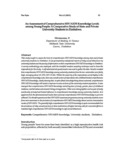Please use this identifier to cite or link to this item:
https://cris.library.msu.ac.zw//handle/11408/799| Title: | An assessment of comprehensive HIV/AIDS knowledge levels among young people: a comparative study of state and private university students in Zimbabwe. | Authors: | Nkomazana, Njabulo | Keywords: | Comprehensive HIV/AIDS knowledge, university students, Zimbabwe | Issue Date: | 2012 | Publisher: | Midlands State University | Series/Report no.: | The Dyke;Vol. 6, No.2; p.53-73 | Abstract: | This study sought to assess the level of comprehensive HIV/AIDS knowledge among state and private university students in Zimbabwe. It was prompted by widespread reports of risky sexual behaviours by university students and th epaucity of information on their comprehensive HIV/AIDS knowledgeinZimbabwe. A survey methodology was employed, with the stratified random sampling technique used to draw the respondents for the study. A self-administered questionnaire was used to gather the data. Results revealed that comprehensive HIV/AIDS knowledge among university students from thetwo universities were fairly high, averaging about 81.25% (SD=15.06). Whilst the majority of the respondents scored highly in the comprehensive knowledge scale,there was a small section of respondentswho exhibited limited comprehensive HIV/AIDS knowledge, clearly showing that,in spite of basic knowledge being almost universal, comprehensive HIV/AIDS knowledge still needs to improve in some sections of the university student population. It also emerged that comprehensive HIV/AIDS knowledge varied by place of study, gender, place of childhood residence,marital status and semester living arrangements. Other socio-demographics such as year of study and faculty of study had limited influence in comprehensive knowledge among university students. It is apparent from the aforementioned results that universal comprehensive HIV/AIDS knowledge is yet to be achieved. It is therefore paramount that HIV/AIDS awareness programmes among university students move from mere awareness to the provision of comprehensive HIV/AIDS knowledge about various transmission modes of HIV/AIDS. The generally high comprehensive HIV/AIDS knowledge is quite recommendable but the prevalence of risky sexual practices at these institutions of higher learning calls for concerted efforts to translate high comprehensive HIV/AIDS knowledge to safe sexual behaviours. | URI: | http://hdl.handle.net/11408/799 | ISSN: | 1815-9036 |
| Appears in Collections: | Conference Papers |
Files in This Item:
| File | Description | Size | Format | |
|---|---|---|---|---|
| hiv aids.pdf | 12.95 MB | Adobe PDF |  View/Open |
Page view(s)
80
checked on Jan 14, 2025
Download(s)
66
checked on Jan 14, 2025
Google ScholarTM
Check
Items in MSUIR are protected by copyright, with all rights reserved, unless otherwise indicated.


